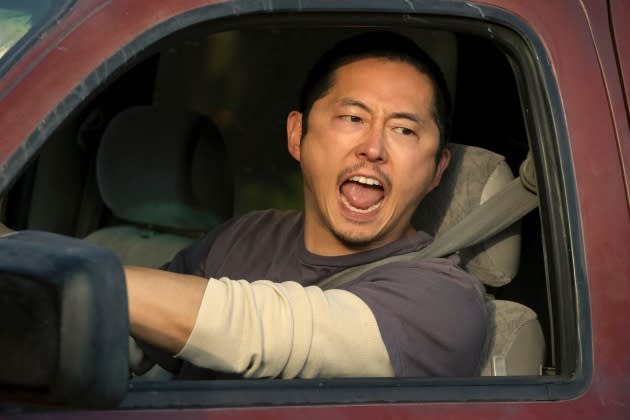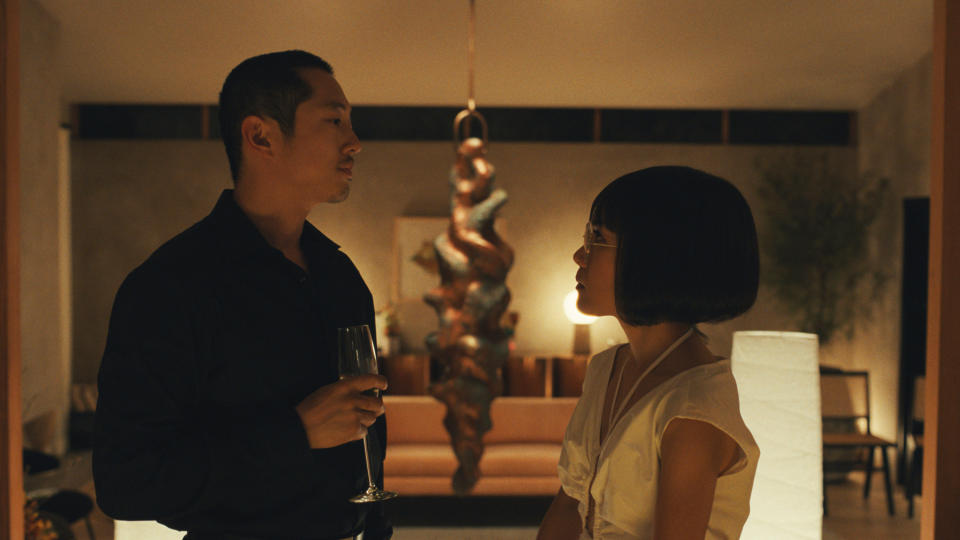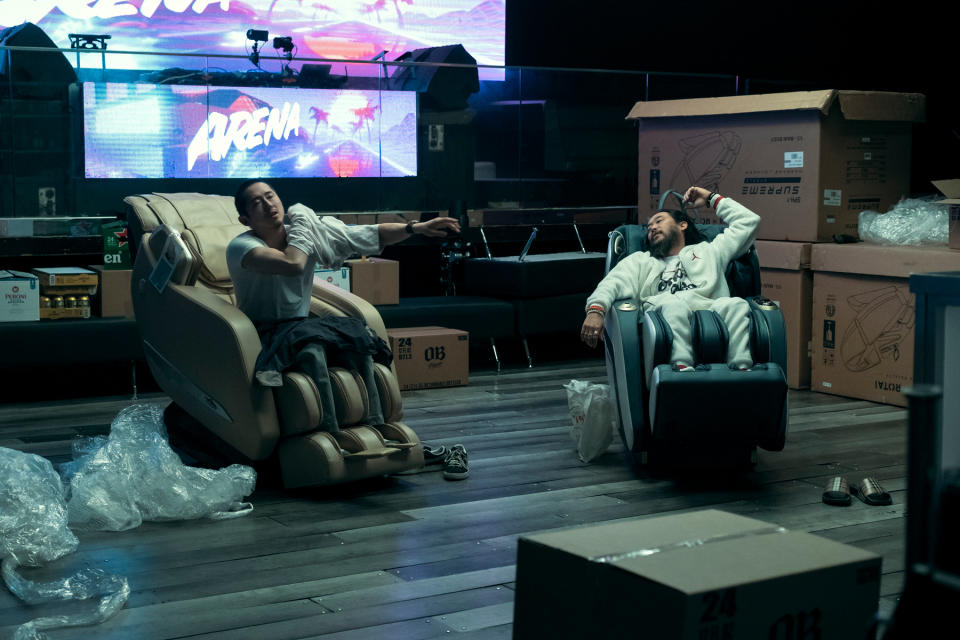Steven Yeun Still Feels Like an Outsider in America
- Oops!Something went wrong.Please try again later.
- Oops!Something went wrong.Please try again later.

Steven Yeun had a lot to say while speaking with Rolling Stone for a story about the making of his incredible new Netflix series Beef, where he plays Danny, a contractor whose life is falling apart even before he and a stranger named Amy (Ali Wong) get into a road rage incident that leads to an increasingly destructive war between the two of them. Because we could only squeeze so many of the versatile, acclaimed, Oscar-nominated actor’s thoughts into that story, here’s a bonus Q&A in which he discusses the blurry line between his life and Danny’s, reteaming with Tuca & Bertie colleagues Wong and writer Lee Sung Jin (who created Beef), his feelings about his childhood days as a Korean immigrant in Canada, and a lot more.
When Sonny [Lee’s nickname] first told you he was developing a show about road rage, what intrigued you enough to ask him to tell you more?
It’s just a feeling, right? Aren’t we all attracted to road rage? It’s so ubiquitous.
More from Rolling Stone
Proper's 'Jean' Celebrates the Life of Jean Jimenez-Joseph, Who Died in ICE Custody
Original 'Scott Pilgrim vs. the World' Cast Returns for More Chaos in Anime Series
This show has a mix of drama and comedy. You’ve done both a lot in your career, while Ali has mostly just done comedy before this. Did any of this ever seem like an adjustment to her?
I think she knew what she was getting into, and I think she was actively preparing and rising to that challenge. And I think she did it wonderfully. It wasn’t much of a transition per se, and more that you’ve got to warm up to things or process things as they’re happening, especially if you haven’t experienced that before. So it was really cool to see her take the reins and roll with it.
How well did the two of you know each other before this? You played a couple on Tuca & Bertie, but you were recording your parts separately.
I remember when her Baby Cobra special came out. I don’t necessarily DM people on Twitter, but I DM’d her. I was like, “You’re so great.” And we got connected that way. And then I came to a show, and we’d run into each other here and there, but we never had extensive conversation. And then Tuca & Bertie, we were largely separated by the way that things are made, so I didn’t get to experience like Ali Ali. And this show brought us together, and it’s kind of amazing.

What’s she like?
She’s dope. She’s a powerhouse. She’s so fun to be around, a generous person and a wonderful professional.
You and Danny share a number of biographical details in common, like emigrating from Korea as a small child. But when you’re doing a scene where Danny’s playing guitar and leading the Korean church’s praise team, does that ever make you wonder where the line is between fact and fiction?
That was incredibly hilarious to play because I used to lead praise at church. And I think Sonny used to be at church in his praise band too. It was like, How do I do this without abandoning this character? But how do I do this while being aware of what I’m doing? It’s earnest, it’s conscious, and it’s trying to serve the story, so that it doesn’t become, “Watch me lead praise.” It becomes, “Watch Danny lead praise.”
Have you ever had road rage yourself?
Oh, yeah. But what’s funny is when I get angry, it’s usually when someone else is also in the car that knows me well. It doesn’t happen much anymore, but it became this performative mad because someone saw me get slighted. But if I’m in the car by myself, I’m usually just like, “OK, yeah, whatever.” I’ve done the same thing, so I let it go.
When you would do it in the past, how would you be performative?
I would lean on the horn and be like, “What the fuck, dude? Are you kidding me?” Now, these days I just grumble, “You fucking…” And I just keep going. Maybe I’m just getting older.
When you’re out in the world, do you feel like people are angrier or less empathetic than they were maybe 10 or 15 years ago?
Oh, for sure. We’re living not only in the metal box on the road, we’re also living in the metal box in our own minds, on our screens. Everything’s tailor-made to an individual existence now. Things are rarely feeling shared. I can only imagine that everybody is living in hard objectification. I could see why everybody thinks everyone’s the enemy and everyone’s out to get each other, so it’s not a surprise that road rage has increased.
Were there ever things in the script that you were being asked to do that gave you pause?
Oh, all of it gave me pause. It’s a study in shame, I think.
The show can be really uncomfortable to watch, deliberately so, whenever we see Danny struggling to get out of an awkward moment, and instead making it worse and worse. Were you as an actor ever uncomfortable with having to do some of this stuff?
I think I was uncomfortable to do all of this, to be quite honest with you. There wasn’t anything particularly specific. For me, it was just like, Can I love this guy? Can I not abandon Danny? Because every part of me, and probably all of us, would leave Danny by the wayside. And for me, the goal was to never bail on him, that he’s deserving of his truthful telling of his point of view.
Were there things Danny did that you particularly struggled to reconcile for yourself?
Some of the things we find out that he’s done with his brother are pretty rough. I think for me it was less of a judgment of, How dare you do that?, and more, What could possibly possess you to hold onto your brother so tightly? And I can relate to that to a degree. I think when you’re an immigrant, you come over here and your whole worldview shifts, and you just hold dear to the people closest to you, even if you have to choke them out. That was the way in: I see this experience of coming and immigrating, or being put upon in this way, has really messed with you, and that was gnarly to traverse.
In your time growing up in Canada and in the Midwest, did you ever feel that same sense of, “I’m not quite fitting in here?”
Oh, yeah. The minute I got here, to be quite honest. I have this kindergarten photo of me when I first arrived in Canada in Regina, Saskatchewan. It’s a group photo, and I had just spent months crying every day, being dragged to school. You can see me and I look so sad. And there’s a little gap between me and the next person. And then you look at photos of me when I was in Korea just the year before, and I’m flipping my head upside down, so excited, still feeling so safe.
At what point did you start to feel like, “This is OK, I can be here. I belong here. I don’t have to feel the way I was feeling when I first arrived?”
To be honest, I don’t know if that’s ever going to go away. And it doesn’t necessarily mean that this place is rejecting me. That feeling helps me excavate the ability to tell Danny’s story truly. There’s so many different stories out there of all of us. And I think the difficulty is that sometimes the world tries to conform those things and those eclectic stories into one understandable thing. The helpful thing for me as an actor, is to just live in that place of, Oh, it’s not that I’m being rejected everywhere, it’s just that the totality of me maybe isn’t being processed everywhere, and that’s OK. That’s just reality.
You work in a business that has not always had the greatest track record when it comes to Asian leads. In the time since you’ve left Walking Dead, have you ever felt like, “I need to prove myself more in order to get this part, in order to do the things that I want to do?”
For sure, that feeling is there. My response to that was less about proving myself to the system to allow me to play within the system, and more about showing who I was in the only way that I could in freedom, which was largely outside of the system. Only to then come back to the system with my new definition, and hope that the system will then allow me to play within it in the way that I feel comfortable.
Walking Dead was a huge show. Glenn was a beloved character. But do you feel like since this time when you were going off doing these independent projects, the business now looks on you differently than they did right after you left the show?
Absolutely. And that was the goal. Well, I don’t know if that was explicitly the goal. I can’t sit here and say I was conscious of what I was aiming at. I think for me, I was mostly responding to this feeling that I was not allowed to be more free than I was. And so getting to now be here and play the roles that I’ve played in the past, and even to portray someone like Danny in America, for American viewers and the world, that’s awesome. So I’m thankful.
When you say it wasn’t a conscious thing, I’m curious whether there was any grand strategy to the kinds of parts you’ve taken in the last few years, or if you were just individually responding to the material in each?
I think it was more the latter, especially because I don’t know that those scripts exist. I have a difficult time when people ask, “What do you want to do next?” I’m like, “I have no clue. I don’t even know what’s available to me.” One of the more difficult things to navigate from my point of view is sometimes I can’t even see what I’m capable of being allowed to do or to play. And I don’t even mean that from a skill level. I just mean that from, how else am I able to be? And sometimes, a casting director or a director or an incredible writer sees you in a way that you can’t even see yourself. And they go, “Hey, what about this reflection of you? Are you into that?” And you go, “No, that’s not me. Wait, is that me? Oh, shit, that’s me too. OK, cool. I’ll play that one.” But if there is a strategy, it’s just been I don’t really respond well to treading territory that I’ve already tread. And so that’s really all it is. I’m just looking for something to stretch, inspire, scare. And that’s how I’ve been largely navigating.

Do you ever look at a script and say, “I haven’t done this kind of thing before?”
Yeah. I do. And sometimes you don’t even like the thing that you haven’t done before. I’m not looking to play Danny. I’m not like, “Yes, sign me up for that experience.” But then having your friend say, “I think Danny’s story needs to be told and is something that we can both relate to and understand and really excavate,” then you’re like, “All right, I’ve got a person I trust, let’s do it.” And then it feels so good to liberate yourself and to explore characters like this, explore that side of you that’s living in lack or living in a different mindset than maybe what you’re experiencing now.
You’ve done a lot of tragedy, you’ve done quite a bit of comedy. This show has both of those, but definitely for a while you were more known for dramatic pieces. I always hate this kind of question, but I don’t know a better way to ask it in this context: When did you know you were funny, Steven?
Oh, man. Am I funny?
Yes.
Thanks. I appreciate that. I don’t know. I think largely my funny for a while was a survival mechanism. I led with self-deprecating humor most of my adolescence to just fit in and be allowed. And then at some point, I wasn’t able to be self-deprecating anymore because it didn’t work. And then I had to recalibrate to be like, How do I even look at myself? How do I view myself? Is it a twisted image of me? Is it a true image of me? And I’m lucky that this is my job, that so many reflections and mirrors in these directors and scripts and experiences get to go, Hey, maybe you don’t even see how full you can be, how many different shades of you you can touch. And so I feel very blessed that I am constantly made to crush the image I have of myself to myself forcefully, because I don’t think I would give it up willingly.
Over the course of your career you’ve been one of the stars of an enormously-popular show, been nominated for awards, and worked with all these amazing filmmakers. Being able to slip into these different characters and being received the way that you have, does that help you feel more like, “People are seeing me. It’s going OK?”
That’s a deep question. I think Nope was a really interesting study for me personally, and getting to work with Jordan [Peele] in excavating that particular side of this business, which is some people enter into this business to be seen, but the whole point of this business is to not be seen. And sure, you might be lauded for your performance, but also you’re still projected on, because no one really knows who we are to each other. Instead, I feel like I’m occupying more of the role of being a public figure at times, that isn’t in totality who I am. And so I’ll be honest: I’m grateful for the support and the validation. I think that’s a really wonderful feeling. But sometimes, you could feel more isolated, to be quite honest.
When you’ve worked with filmmakers of Korean descent, is there any kind of shorthand that makes the job easier for you?
I would be remiss if I said no, but it also comes with its own complications. If I’m working with Bong [Joon Ho] or Director Lee [Chang-dong], it’s also its own navigation, because I’m not Korean Korean, and so there’s a dissonance there too — maybe I’m gaining certain things, but I’m losing other things. But what has been a really nice process is working with [Lee Isaac Chung] or Sonny. I’ll go, “You know what I’m talking about?” And then they’re like, “I know what you’re talking about.” So there’s much less explanation.
You’ve gotten to do a whole lot of different things lately. Are there certain kinds of roles or projects that you have yet to do that you would really like to?
I’m so bad at answering this question. I don’t know if I have a feeling of, I’ve got to play that thing. But what I am looking forward to hopefully participate in is something that I got to touch early in my career, that I was so grateful for, which is really connecting with people. I thought Walking Dead was such a large communal experience that got to touch a lot of people at the same time. And whatever that means, if big films will have me, if… You look at Avatar and you’re like, “Wow. Wow.” We can go into the weeds about whether people like it or not, or good or bad, but that brought people together. And that sounds really exciting for me, and that’s what I’d like to participate in moving forward with a bunch of other things. That sounds exciting to me.
All 10 episodes of Beef are now streaming on Netflix.
Best of Rolling Stone

